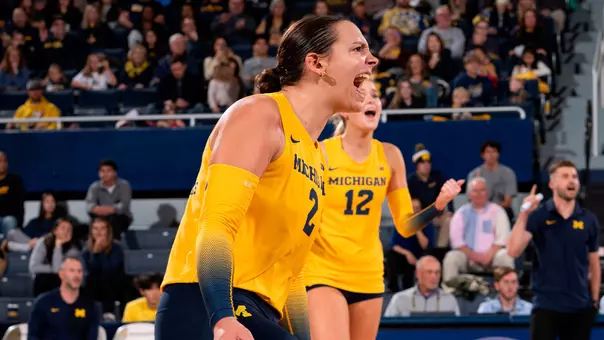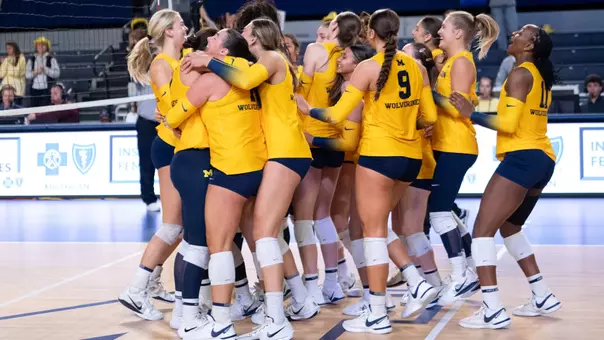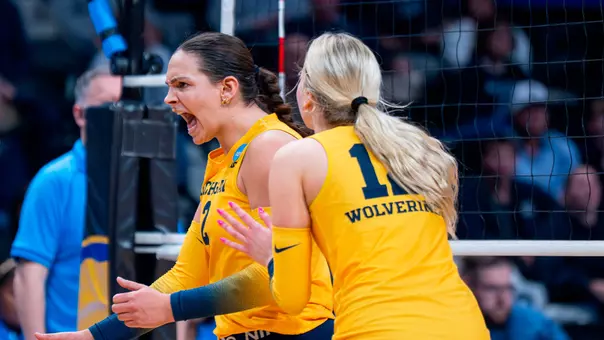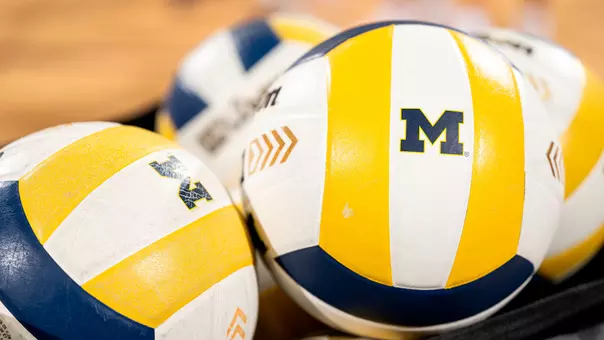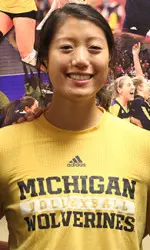
Kornacki: Zhou Making Most of Life Transition
10/29/2015 12:00:00 AM | Volleyball

From left: Leisa Rosen, Cindy Zhou, Mark Rosen
By Steve Kornacki
ANN ARBOR, Mich. -- Cindy Zhou hadn't felt quite right for a while. Her offseason workouts with the Michigan volleyball team had become a strain dating back to winter break. She found herself getting winded and worn out easily, and that made no sense to somebody in top physical condition. Then, one day in late June, after running, she "blacked out" and had blurred vision.
"But as athletes, we push through it and play with pain," said Zhou. "The more I struggled, the more I tried to fight it. That's the athlete mindset."
She didn't want to get checked out by the team trainer after blacking out, but Wolverines associate head coach Leisa Rosen demanded she do that. Zhou was given a monitor to wear for 48 hours in order to provide medical feedback on what she was experiencing.
Then, after dropping off teammate Gabbie Bulic at Detroit Metropolitan Airport in Romulus, a half-hour drive east of campus, her cell phone rang. It was a doctor with the results from her monitor.
Something was very wrong.
"You need to go to the ER right now," the doctor told Zhou.
She replied, "I'm driving a car. Is that safe?"
The doctor provided warning signs that would require her to pull over on the side of the road and dial 911. But she didn't sense that she might be close to passing out and drove to the emergency room at the University of Michigan Hospital, saying she was simply able to "block out" the anxiety expected in a life-threatening situation.
Zhou said the doctor, after studying the feedback on her monitor, told her she'd experienced numerous "irregular heartbeats" that escalated when she was working out.
"I would go into ventricular tachycardia," she said. "That is the rhythm that eventually stops your heart and causes cardiac arrest. So, at any point in time, my heart could've stopped. But I was so lucky that it didn't."
Once at the ER, Michigan volleyball trainer Tim White met Zhou, who was quickly hooked up to monitors. She stayed in the hospital for three days for observation, receiving a cardiac MRI and an echocardiogram.
What was revealed was a condition that would require heart surgery.
"When I work out," she said, "instead of building up healthy heart muscle, it builds scar tissue. That disrupts the signals in my heart, which caused the irregular rhythms. When that happens for too long, it stops your heart. A lot of times, when you hear of athletes collapsing on the court, they have what I have. Only, they didn't know they had it.
"So, I was really, really lucky not to have that happen and to know that I have it."
Surgery was required to place an internal defibrillator, and that took place in late July. Her recovery took three weeks, and it was difficult to deal with the pain because she couldn't initially take medication to cope with it. She had to learn to sleep on her right side, get used to having the monitor in her upper body and regain full motion in her arms. But now Zhou said she "hardly notices" the defibrillator.
"It goes up to my heart and monitors my heart rate," said Zhou. "If my heart were to go into the rhythms that would stop it, it shocks my heart to shock me out of the rhythm.
"I haven't been shocked yet, but I'm not going to lie. I kind of want to get shocked just once to know what it feels like."
Head coach Mark Rosen, whose wife combines to coach the team with him, smiled and waved off that request by Zhou.
He told her: "You might want that to happen, but I don't. I hope that thing never goes off."
She said the heart condition has caused a "lifestyle change" that allows for only light workouts, and she constantly checks her monitor to assure she doesn't go above the allowed heart rate. There's no way she can play pickup soccer, and her volleyball playing career is over.
However, like other student-athletes at Michigan such as basketball player Austin Hatch, she is allowed to maintain her scholarship on a medical hardship waiver. It pained Zhou to think she wasn't going to be part of the team, but Rosen asked her to become an undergraduate student assistant coach.
"It was difficult," said Rosen. "But I told her, 'The best thing is that we're having this conversation.' And I've never once seen her feel sorry for herself or say, 'Why me?'"
Zhou made the transition to coaching, but said, "It was hard watching them play at first. It's really tough."
She paused, looked away for an instant, and added, "But I am so lucky and thankful to still be here considering how severe the consequences of what I have could've been. I didn't go into cardiac arrest; I'm still here.
"And I'm still a part of the team, and my teammates are quick to remind me of that. I'm super involved but just have a different role."
Zhou considered several other Big Ten schools as a star at Libertyville (Illinois) High, but said what attracted her to Michigan was "how great" both the academics and athletics were.
"But I also loved the family atmosphere I found here," she said. "That's so important to me, and everyone here is my second family now. I spend more time with these girls than I have anyone else in my life, and that's a big reason why I picked Michigan. I can't imagine not spending time with these people all the time."
That "second family" helped get her through losing her playing career and nearly losing her life. She calls volleyball classmates Abby Cole and Bulic her "best friends" along with five field hockey players with whom she shares a rented house a short walk from Cliff Keen Arena, where the volleyball team plays.

Cindy Zhou with Abby Cole and Gabbie Bulic
The Rosens also have been a central part of her life.
"I love that Mark and Leisa care about you as so much more than just a volleyball player," said Zhou. "They are both great and are like a dad and mom to us. And together they are awesome."
Zhou never considered coaching prior to becoming a student assistant, but said she enjoyed coaching at summer camps and helping out at Libertyville High when she went home.
Rosen has her monitor workouts for players who aren't allowed to travel to road games due to roster limits and set the ball for them in drills. She organizes and runs some drills at full-team practices.
"It's been a smooth transition that really benefits the program," said Rosen.
And though she loves working with the Wolverines, she can't say that coaching is in her future.
"But I love helping people understand things and working with others," said Zhou. "Those are things I want my future career to have."
Rosen has no doubt Zhou would be a great coach, but chuckled and said, "I think she's way too smart to be a coach. I'd hate to limit her that way."
He added, "If you could buy stock in people, I'd buy as many shares of Cindy as I could. She's a ridiculously smart person, and not just book smart. She's people smart. She's socially smart."
She was accepted into the Stephen M. Ross School of Business one week before having the surgery and is working on her bachelor of business administration degree. She's leaning toward sports marketing or retail work and management for a career.
Zhou said, "I had a sudden change in life, but I'm going to deal with it. Mark always says that."
She knows first-hand how quickly life can vanish.
Zhou lost her mother, Shelly Zhou, suddenly when she was 14, but said the sources of her mother's organ failures were never determined.
"My mom played professional volleyball in China and got me into it," said Zhou. "She didn't really push me to love volleyball, but she gave me extra lessons and training. Though, she was the driving force in me picking volleyball."
Her mother matched her skills to a position, training her to be a setter. Cindy redshirted as a freshman and had outstanding games last season against Oregon, Kansas State and Youngstown State. But it was a big team win against Nebraska that she said was the game that meant the most to her.
Her father, Qian (pronounced Chan) Zhou, was a standout soccer player in China and came to the U.S. with Shelly to pursue degrees at East Carolina and LSU. They stayed here and Qian is a statistician.
Zhou's father, stepmother, Wendy Tian, and two younger siblings got to watch her play several matches last season, and she's thankful for that.
It's hard not playing any more, but she's remained part of the team and contributes as "another set of eyes" for her teammates. She's also thriving as a student in the prestigious business school.
"My mom never even knew that I committed to Michigan before she passed away," said Zhou. "But I know she'd be so proud of me."

